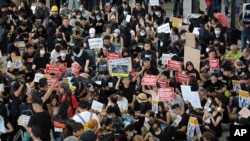Report updated at 9 p.m., July 26, 2019
More than 1,000 black-clad pro-democracy protesters staged a peaceful sit-in at Hong Kong's international airport Friday, greeting incoming visitors with warning signs in simplified Chinese, English, German and other languages.
Sparked by a now-suspended extradition bill, the activists' demands have since expanded to encompass calls for direct election of leaders and an investigation into alleged excessive use of force by police. Though embattled chief executive Carrie Lam has called the extradition bill "dead," protesters continue to demand its full withdrawal.
Activists covered themselves in sticky notes layered with pro-democracy slogans, making themselves into human "Lennon walls" as they sang a protest anthem from the hit musical "Les Miserables."
Some travelers and even airport employees also took part in the 11-hour event.
Friday's protest is the latest in nearly four months of public demonstrations, and it is partially in reaction to violence at another event Sunday that left 45 injured. Video shows a mob of white-clad men, thought to be affiliated with "triad" criminal gangs, attacking protesters last Sunday at a rail station in Yuen Long.
Activists have criticized the police for a 40-minute response time, alleging collusion between police and the triads. Rumors about an attack on protesters had started circulated the day before. Six men with gang links have been arrested.
Meanwhile, tensions have risen between pro-democracy activists and village residents, who often support the establishment. The Chinese government may be fanning the flames.
A week before the violence in Yuen Long, a mainland Chinese government representative had told locals to push protesters out of the town, saying, "We won't allow them to come to Yuen Long to cause trouble," according to The New York Times.
Another demonstration is planned for Saturday in Yuen Long, though police have formally objected. Protesters will be breaking the law if they march, a police commander said Friday, but both police and activists are still preparing.
Some are trying to get around the ban by satirically labeling the protest as a mourning event for hardline former premier Li Peng, who died this week.
Religious gatherings and funerals don't require police permission in Hong Kong.
Protesters alternately framed Saturday's event as "a walk," and to "stimulate the Yuen Long economy," the Guardian reported advertising sales on makeup that's popular with visitors.
Police also barred an anti-police demonstration in Sheung Wan planned for Sunday, citing concern for public safety and order, according to the Hong Kong Free Press.
In a letter to organizer Ventus Lau, the authorities wrote, "The police have reason to believe that the actions taken by participants may not be under your control ... [and that] you do not have the ability to ensure the personal safety of participants or other members of the public."
A schedule indicates at least six more protests throughout July and August, as shared by a Hong Kong Free Press journalist.
China appears to be shifting its strategy, from ignoring the protest movement and censoring related discussion to denouncing it via state-run media.
The initial extradition bill behind the protests would have allowed Hong Kong residents charged with criminal offenses to be taken to China for trial, which opponents worried could be used against outspoken critics of China.
As a Special Administrative Region, Hong Kong enjoys a measure of semi-autonomy from China, including fewer restrictions on free speech. It has become a small democracy, but this status is only guaranteed until 2047, and China has indicated it will ramp up its control of the city.




